New Update: Boost Social Proof with Reviews & Automation
New Update: Boost Social Proof with Reviews & Automation
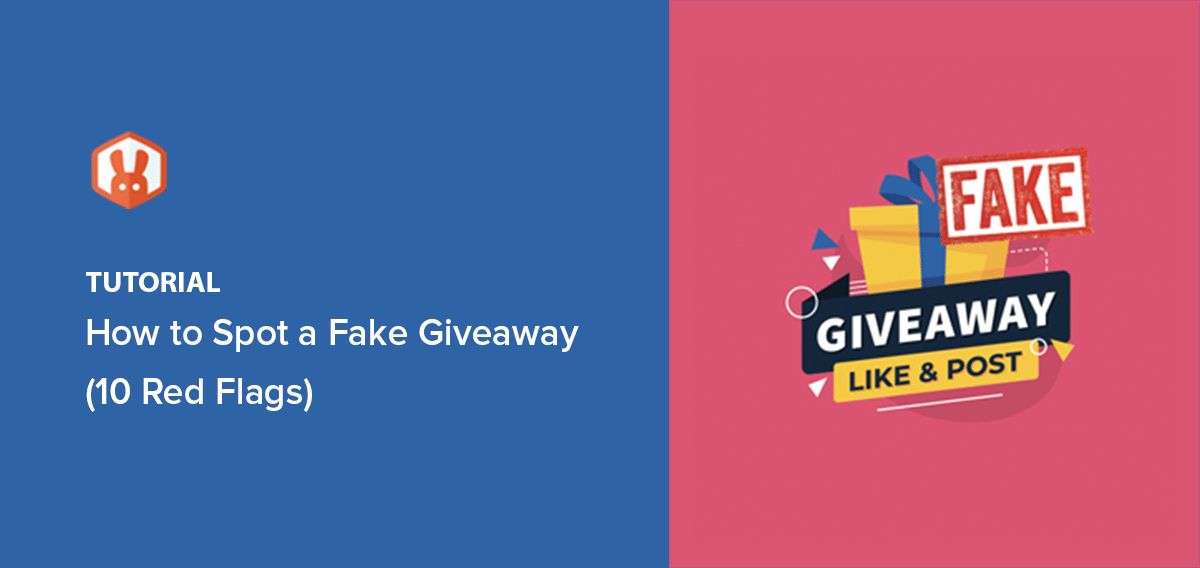
 John Turner
John Turner
 John Turner
John Turner
I’ve entered hundreds of online contests, and I’ve also seen just how common fake giveaways really are. They promise huge prizes but are often traps to steal your data or worse.
The Federal Trade Commission received over 2.4 million fraud reports related to prizes, sweepstakes, and lotteries. That’s a staggering number—and a clear sign that giveaway scams are everywhere.
Knowing how to spot a fake giveaway isn’t just helpful—it’s essential if you want to stay safe online. In this guide, I’ll show you the red flags I always look for so you can avoid scams and join real giveaways with confidence.
If you’re running a giveaway yourself, RafflePress makes it easy to build one people can trust—no coding needed. It includes verified entry options, a distraction-free landing page, and built-in fraud protection tools to keep things fair.
🔍 Quick Summary: How to Spot a Fake Giveaway
Scammers use fake giveaways for two reasons: to get your information and money.
Here’s how they typically do it:
Knowing these tricks is the first step to staying safe.
Now that we understand why scammers create fake giveaways, let’s explore how to identify these scams.
I’ve entered many online giveaways and learned a thing or two along the way. The truth is, not every contest is as genuine as it appears.
But don’t worry, I’ve picked up some reliable ways to tell if a giveaway is legit. These warning signs of fake giveaways can help you avoid scams and stay safe when entering online contests.
When you come across a giveaway, take time to check the account behind it thoroughly. Is it genuine or a clever impersonator?
Start with these steps:

For instance, a fake account impersonating Nike might use a name like ‘Nike.Official’ instead of the verified ‘@Nike’ account.
Once you’ve verified the account’s authenticity, it’s time to take a closer look at what they’re offering.
Ever heard the saying, “If it seems too good to be true, it probably is”? That’s your golden rule for giveaway prizes.
I’ve seen prizes ranging from reasonable to ridiculous. A bundle of books on herbs from a herb brand is believable.

But a luxury yacht from a pizza parlor isn’t so much.
Here’s a quick way to spot fishy prizes:
Companies use giveaways for marketing. The prizes should be exciting, but not break-the-bank unbelievable.
So next time you see a prize that makes your jaw drop, ask yourself: “Does this make sense?” If not, it might be part of a fake contest or giveaway scam.
Real giveaways usually have straightforward entry methods. They might ask you to follow an account, share a post, or tag a friend.
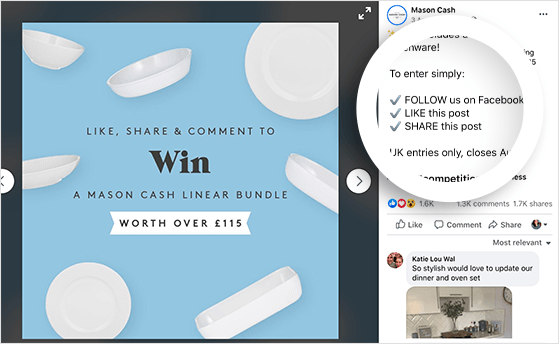
But when a contest asks you to fill out a 20-page survey, download an app, and refer 10 friends, that’s when alarm bells should ring.
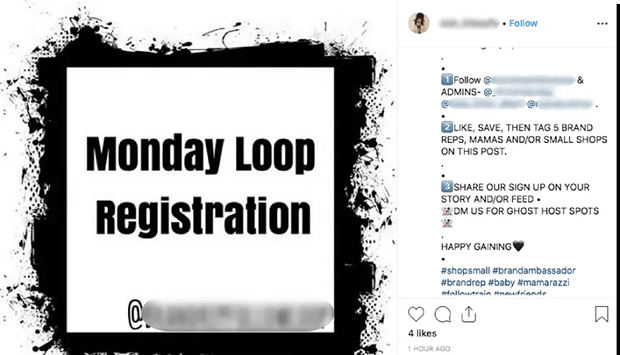
Watch out for giveaways that want you to:
If a giveaway asks for more than you’re comfortable sharing, it’s probably not worth it. Legitimate contests respect your privacy and time. They’re not trying to harvest your data or trick you into buying something.
You should never have to pay to enter a real giveaway. If there’s a price tag attached to your entry, it’s likely a scam in disguise.
When you’re checking out a giveaway, pay attention to how it’s written. Good spelling and grammar are often signs of a real contest.
Here’s what to look for:
A small typo here and there isn’t always a problem. But if you spot many errors, be careful. Actual companies usually take time to write their giveaways correctly.
Would a big company announce an important giveaway with lots of mistakes? Probably not.
So, when you’re looking at a giveaway, take a moment to read it carefully. If the writing seems sloppy, it might be a sign to be extra cautious about the contest.
Think of your personal information, like your house keys. You wouldn’t hand them over to a stranger, right? The same goes for online giveaways.
Legit contests typically ask for basic contact information. Name, email, and sometimes a phone number are usually acceptable.
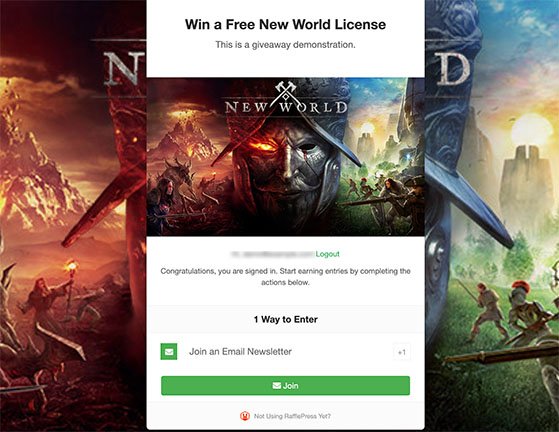
But if a giveaway starts asking for your life story, it’s time to hit the brakes.
Keep in mind that different giveaways may ask for different information. A local cafe might just want your name and email for a free coffee. But a big travel contest, especially for international prizes, could ask for more, like your address or passport details.
Always think carefully about what you’re being asked to share. Ask yourself:
Even if the giveaway is real, be smart about your personal information. If you’re not sure, you can contact the company directly to check.
Before you get excited about a giveaway, take a second to look at the website itself. Is it secure? This might not seem as fun as thinking about the prize, but it’s crucial for keeping your personal info safe.
Start by looking at the website address. Do you see a padlock icon next to it? How about “https://” at the beginning instead of just “http://”? These are good signs that the site takes your security seriously.

Now, make sure you’re actually on the real company’s website. Scammers are sneaky – they sometimes create fake sites almost identical to the real deal. They might change just one letter in the web address, hoping you won’t notice.
While you’re at it, take a look at the site’s overall design. Does it seem professional, or does it look like it was thrown together in a hurry? Legitimate companies usually put effort into making their websites look good and work smoothly.
If the giveaway asks for personal information, look for a privacy policy. It should explain how they’ll use your data.
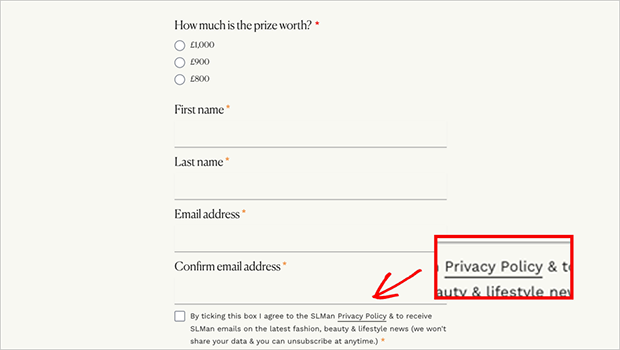
When looking at a giveaway, it’s good to check out contact details. Real giveaways usually have clear ways to contact them.
Look for an email address or phone number matching the contest’s company. If it’s a big brand, they’ll probably use their official email, not a personal one like Gmail or Hotmail.
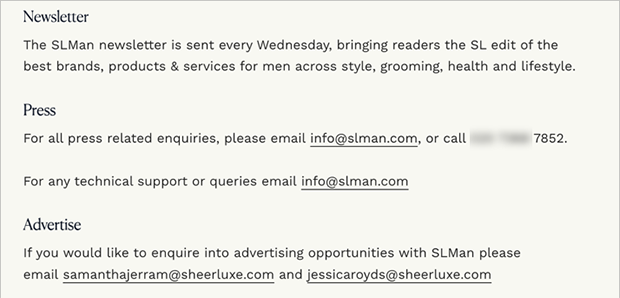
Be careful if they only offer a form to fill out without any other contact details. While contact forms are common, having no other option might be a sign something’s off.
If you’re unsure, try contacting the company through its official website or social media. Ask them if the giveaway is theirs. Most businesses are happy to confirm whether a contest is legit.
When you come across a giveaway, look close at how it’s presented. Does it match the company’s usual style?
Real brands are careful about how they look online. Their giveaways should use the same logos, colors, and fonts as their website or social media.
If something seems off, like blurry images or weird-looking logos, that’s a warning sign.
Check if the giveaway fits the brand’s personality. A serious finance company probably won’t use lots of emojis or slang, but a fun clothing brand might.
In this example, you can clearly see that the giveaway is legit. The tweet uses the same branding as the website. It even has a matching blog post promoting the giveaway.
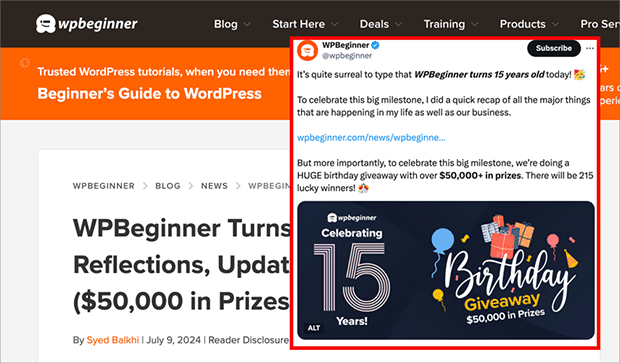
Be wary of giveaways that mix up different brands without a clear reason. Scammers sometimes throw in big names to look more impressive.
If you’re not sure, compare the giveaway to the company’s official website or social media. They should look and feel similar.
It might be tempting to skip over the fine print, but don’t. The rules of a giveaway can tell you a lot about whether it’s real or not.
Legitimate giveaways always have clear, detailed rules. These should explain how to enter, who can participate, how winners are chosen, and what prizes are available.

If you can’t find this information, or if it’s super vague, that’s not a good sign.
Pay attention to the eligibility requirements. Are they reasonable? Most giveaways have age limits or country restrictions. If the rules seem overly complicated or don’t make sense, be cautious.
Look for information about how and when winners will be notified. Genuine contests are upfront about this process. They might even list past winners or explain how you can request a winners list.

A suspicious rule might state: ‘Winners must pay a $50 processing fee to claim their prize.’ But remember, legitimate contests don’t charge winners.
If there are no rules or if the terms sound vague, it’s often a sign of contest fraud.
After examining the rules, another key aspect to verify is the giveaway’s track record.
Looking through a brand’s past winners is one of the easiest ways to tell if a giveaway is legit or just another fake contest.
Try searching for previous giveaways from the same company. Do they regularly post about who won? Look for winner announcements on their social media pages or website. These posts often include the winner’s name (or initials) and sometimes even photos of them with their prizes.

While not every contest publicizes winners, many do. If a company runs lots of giveaways but never seems to announce winners, that’s suspicious.
Be wary of winner announcements that are super vague or always look the same. Actual winner posts usually have some variety and specific details.
Now that you know how to identify fake giveaways, let’s discuss what actions you should take if you encounter one.
So you’ve spotted a fake giveaway. Good job! But what now? Here’s what you can do to help yourself and others:
Don’t just ignore it; take action. Reporting fake giveaways helps protect others from falling for the same scam.
On Facebook, click the three dots next to the post and select “Report post.” Choose the option that best describes the issue.

For Instagram, tap the three dots above the post and select “Report.” Then, follow the prompts to explain why you’re reporting it.
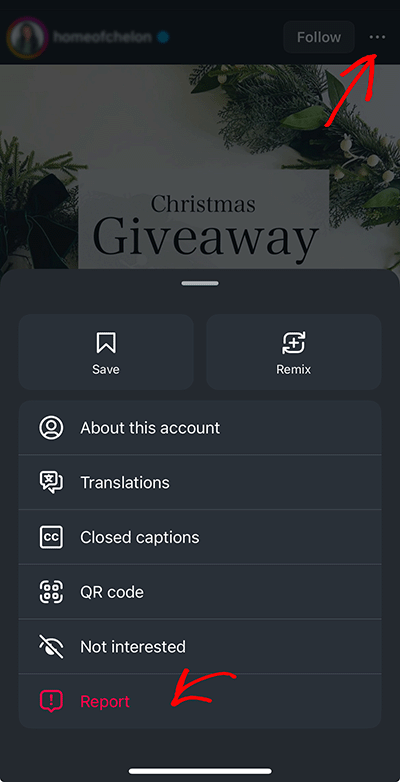
On X (Twitter), click the three dots on the tweet and choose “Report Post.” Select the most appropriate reason.
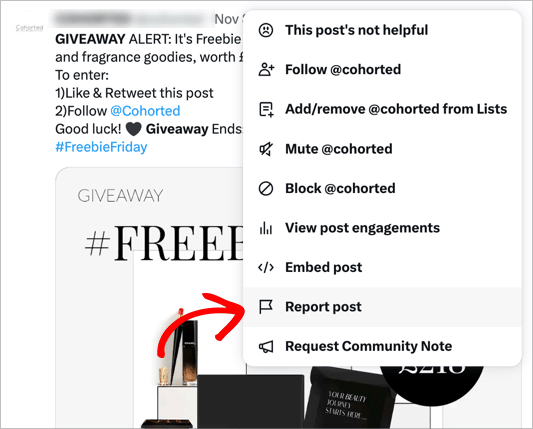
You can also report scams to the Federal Trade Commission. They use these reports to investigate and stop scammers.
If you’ve interacted with a fake giveaway, it’s time to shore up your defenses:
With your information secured, you’re ready to approach future giveaways with confidence.
Now you know how to spot fake giveaways, you can join online contests with confidence. There are plenty of real giveaways out there that can be fun and rewarding.
Let’s quickly go over what to remember:
If you think a giveaway is fake, report it. This helps protect others, too.
For those running giveaways on WordPress, tools like RafflePress can help make your contests safe, trustworthy, and easy to set up.
And if you need more giveaway advice, check out the following guides:
If you liked this article, please subscribe to our YouTube Channel for RafflePress video tutorials. You can also find us on Twitter and Facebook.
Disclosure: Our content is reader-supported. This means if you click on some of our links, then we may earn a commission. We only recommend products that we believe will add value to our readers.
Copyright © 2024 SeedProd LLC. RafflePress® is a registered trademark of SeedProd LLC